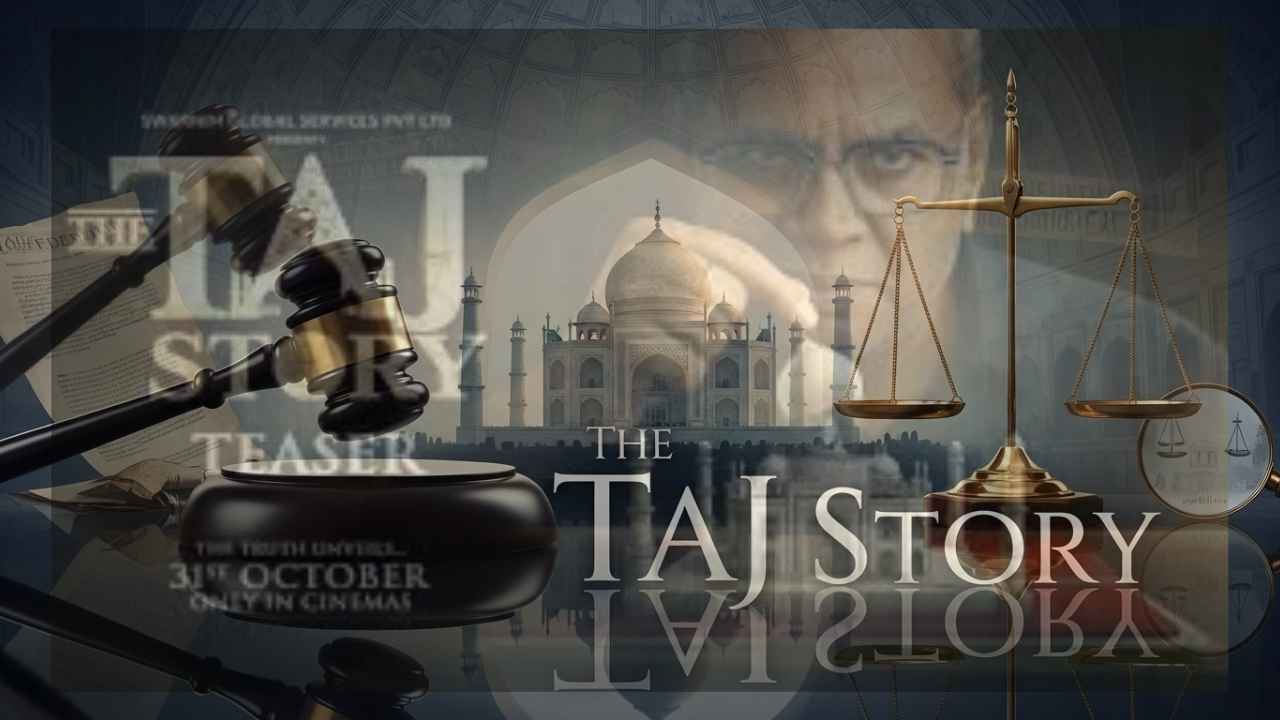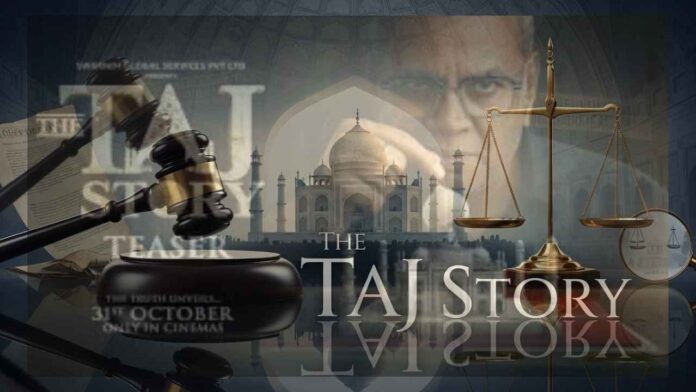
“The Taj Story” (2025) is a bold Hindi courtroom drama directed by Tushar Amrish Goel, starring Paresh Rawal as Vishnu Das. Releasing in theatres on October 31, 2025, the film questions the true origins of the Taj Mahal through gripping legal battles, intense performances, and thought-provoking storytelling.
Table of Contents
Basic Info
Title: The Taj Story
Release Year: 2025
Platform: Cinema (Theatrical Release: October 31, 2025)
Director: Tushar Amrish Goel
Lead Cast: Paresh Rawal (as Vishnu Das), Zakir Hussain, Amruta Khanvilkar, Namit Das, Sneha Wagh
Genre: Drama, History, Political, Courtroom Drama
Runtime: 120 minutes
Language: Hindi
Introduction/Context
Few monuments in the world hold as much mystique and grandeur as the Taj Mahal. It is a timeless symbol of love, an architectural marvel, and a cornerstone of India’s rich heritage. But what if the accepted narrative surrounding its origins were to be fiercely challenged? Director Tushar Amrish Goel’s upcoming film, “The Taj Story,” promises to do just that, offering a thought-provoking and intensely dramatic exploration into the heart of this iconic structure. Slated for a Diwali 2025 release, this film is already generating significant buzz, positioning itself as a cinematic event that demands attention and discussion.
https://bharatdiaries.com/ace-frehley-dies-at-74-kiss-guitarists-wild-ride/
Plot Summary (Spoiler-Free)
“The Taj Story” is primarily a gripping courtroom drama that centers on Vishnu Das, a local guide at the Taj Mahal, portrayed with compelling depth by veteran actor Paresh Rawal. Driven by an insatiable curiosity and a profound conviction, Vishnu Das embarks on a personal quest to unearth what he believes to be the monument’s true history. His journey leads him to file a legal lawsuit, challenging the conventional narrative and raising controversial questions about the origins of the Taj Mahal. The film delves into the long-standing debate: Was the Taj Mahal originally built as a tomb, or does it hold a different, perhaps older, historical identity as a temple? The trailer hints at heated exchanges and a profound clash of beliefs and documented history within the courtroom, as Vishnu Das even demands a “DNA test” for the monument to ascertain its actual origins.
Performances & Characters
At the heart of “The Taj Story” is undoubtedly Paresh Rawal’s portrayal of Vishnu Das. Known for his ability to blend intensity with subtle nuance, Rawal brings a captivating earnestness to a character driven by a relentless pursuit of truth. His performance is expected to be a masterclass, anchoring the film’s challenging premise with gravitas and emotional resonance. The courtroom scenes, particularly the exchanges with Zakir Hussain, who plays the opposing lawyer, are poised to be electric. Hussain, a formidable actor himself, provides a perfect foil, creating a dynamic tension that fuels the drama. The ensemble cast, including Amruta Khanvilkar, Namit Das, and Sneha Wagh, are set to deliver strong supporting performances, adding layers to a narrative that intertwines legal proceedings with deep-seated historical and cultural convictions. The film requires its actors to carry the weight of historical debate and societal expectations, and early indications suggest they rise to the occasion magnificently.
Direction & Writing
Tushar Amrish Goel takes on the dual role of writer and director, a testament to his clear vision for this ambitious project. The screenplay is commendably intricate, weaving historical speculation with the rigid structures of a legal battle. It’s a challenging tightrope walk, but the writing seems to navigate it with confidence, presenting arguments and counter-arguments that keep the audience engaged and questioning. Goel’s direction is expected to be both grand and intimate, capable of capturing the majestic scale of the Taj Mahal while focusing on the human drama unfolding in the courtroom. The narrative aims to provoke thought rather than dictate conclusions, inviting viewers to form their own interpretations, which is a sign of mature and responsible storytelling.
Technical Aspects
A film centered on a monument like the Taj Mahal demands exceptional technical prowess, and “The Taj Story” appears to deliver. Satyajit Hajarnis’ cinematography promises to be breathtaking, capturing the iconic beauty of the Taj Mahal with reverence, while also highlighting the solemnity and intensity of the courtroom environment. The editing, helmed by Himanshu M Tiwarii, will be crucial in maintaining the film’s pace, ensuring that the historical exposition blends seamlessly with the dramatic tension. Music by Rohit Sharma and Rahul Dev Nath is expected to be evocative, underscoring the film’s emotional beats and adding to its epic feel. While the film’s plot revolves around historical questions rather than historical recreation in the traditional sense, any visual effects used to depict historical contexts or enhance the grandeur of the Taj Mahal are likely to be employed with a focus on authenticity and visual splendor.
Themes & Messages
“The Taj Story” delves into profound themes that resonate deeply in contemporary society. At its core, it explores the quest for truth and historical re-evaluation, asking how much we truly know about our heritage and whether accepted narratives can withstand rigorous scrutiny. The film navigates the delicate balance between belief and documented history, examining how faith, heritage, and evidence often clash in public discourse. It touches upon the idea of legacy, the politics of history, and the courage it takes for an individual to challenge established norms. The discussions around the Taj Mahal’s origins also bring to light broader questions about cultural identity and the interpretations of historical monuments.
Strengths & Weaknesses
The film’s greatest strength lies in its bold and controversial premise. Daring to question the narrative of such an iconic structure immediately sets it apart. The choice of Paresh Rawal in the lead is a stroke of genius, promising a powerful and nuanced performance that will anchor the film’s complex themes. The courtroom drama format ensures high stakes and compelling dialogue, making even abstract historical debates feel immediate and engaging. The film’s insistence on sparking conversation, not merely controversy, speaks to its intellectual ambition.
As for weaknesses, the very nature of its controversial subject matter might invite unwarranted scrutiny or misinterpretation from certain sections of the audience. While the filmmakers state their focus is on historical facts, navigating such sensitive topics without alienating viewers or appearing to take a definitive stance where none is strictly established can be a tightrope walk. However, given the strong narrative intent and robust performances, these potential challenges are likely to be overcome by the film’s compelling execution.
Comparison/Context
“The Taj Story” can be placed within a genre of films that blend historical inquiry with social or political commentary, akin to investigative dramas that unravel long-held mysteries. While not a historical romance like “Jodhaa Akbar” or “Mughal-e-Azam,” it shares their reverence for India’s past, albeit through a lens of critical examination. It might also draw comparisons to films like “Court” or “Oh My God!”, which utilize a courtroom setting to debate profound societal or philosophical questions, with Paresh Rawal’s previous work in the latter making this connection even more pertinent. The film’s ability to spark debate positions it alongside thought-provoking cinema that challenges the status quo.
Audience Perspective
This film is a must-watch for anyone intrigued by history, particularly Indian history, and those who appreciate intellectually stimulating courtroom dramas. Viewers who enjoy films that provoke discussion and encourage critical thinking will find “The Taj Story” immensely rewarding. It’s also for fans of strong, performance-driven cinema, especially those eager to witness Paresh Rawal’s compelling portrayal. Those looking for a cinematic experience that offers both entertainment and intellectual engagement should mark their calendars.
Final Verdict & Rating
“The Taj Story” is poised to be more than just a film; it’s an event. It fearlessly steps into a contentious historical debate, offering a narrative that is both audacious and meticulously crafted. With Paresh Rawal delivering what promises to be one of his most memorable performances, and Tushar Amrish Goel’s confident direction, the film transcends mere entertainment to become a significant cultural conversation starter. It’s a compelling blend of drama, history, and legal intrigue that will undoubtedly leave audiences pondering long after the credits roll. For its boldness, masterful performances, and incisive storytelling, “The Taj Story” earns a truly exceptional rating.
Rating: ⭐⭐⭐⭐½ (4.5/5 Stars)
